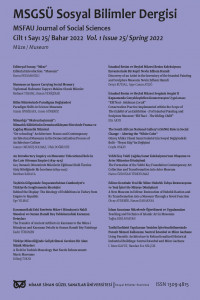Tatar Çölü ve Tabiiyet
Althusser, Foucault, Butler, tabiiyet, özne, iktidar, yapısalcılık, psişe, göstergeler, Tatar Çölü
The Desert of the Tartats and Subordination
Althusser, Foucault, Butler, subordination, subject, power, structuralism, psyche, signs, The Desert of the Tartars,
___
- AKAY, Ali (2004), Tekil Düşünce, Bağlam Yayınları, İstanbul.
- ALTHUSSER, Louis (1991), İdeoloji ve Devletin İdeolojik Aygıtları, Çev: Yusuf Alp-Mahmut Özışık, İletişim Yayınları, İstanbul.
- BUTLER, Judith (2005), İktidarın Psişik Yaşamı, Ayrıntı Yayınları, İstanbul.
- DANA, Sala (2010), Desert as Revealer of Contradictory Truths in Dino Buzzati’s The Tartar Steppeand Kobo Abe’s The Woman in the Dunes, Scientific Journal of Humanistic Studies, Nov2010, Vol. 2,Issue 3.
- DELEUZE, Gilles (2004), Proust ve Göstergeler, Çev: Ayşe Meral, Kabalcı Yayınevi, İstanbul.
- FOUCAULT, Michel (2012), İktidarın Gözü, Çev.: Işık Ergüden, Ayrıntı Yayınları, İstanbul.
- FOUCAULT, Michel (2011) Özne ve İktidar, Çev: Işık Ergüden-Osman Akınhay, Ayrıntı Yayınları, İstanbul.
- GOODCHILD, Philip (2005), Arzu Politikasına Giriş, Ayrıntı Yayınları, İstanbul.
- IŞIK, Emre (2008), Beden ve Toplum Kuramı: Öznenin Sosyolojisinden Bedenin Sosyolojisine, Bağlam Yayınları, İstanbul.
- KESKİN, Ferda (1997), “Foucault’da Öznellik ve Özgürlük”, Toplum ve Bilim Dergisi, Sayı 73, İstanbul.
- MUTMAN, Mahmut (1997), Özne: Bir Başka Arşiv, Toplum ve Bilim Dergisi, Sayı 73, İstanbul.
- ISSN: 1309-4815
- Yayın Aralığı: Yılda 2 Sayı
- Başlangıç: 2010
- Yayıncı: Mimar Sinan Güzel Sanatlar Üniversitesi
Two Modern Poets, One Single Term: “The Correlative” as a Link Between T.S. Eliot and Edip Cansever
Türkiye’de Gönüllülük Çalışmaları Üzerine Bir Değerlendirme
Edebiyatta Susan Karakterler: Modernist Türk Öykücülüğünde Kimlik ve Toplum Dışılık
Taşranın ‘Yok’luğunda Var Olan Sıkıntı: Gölgesizler’de Taşranın Okunması
Mitos ve Tarih: Kitab-ı Mukaddes Üzerine Bir İnceleme
Uzun Sürmüş Bir Günün Akşamı’nda Ölüm
Bir Alımlama Arayışı: Pamuk ve Perec Metinlerinde Nesnelerin “Şey”leştirilmesi
Berci Kristin Çöp Masalları Romanında Siyasal Toplum Tasavvuru
